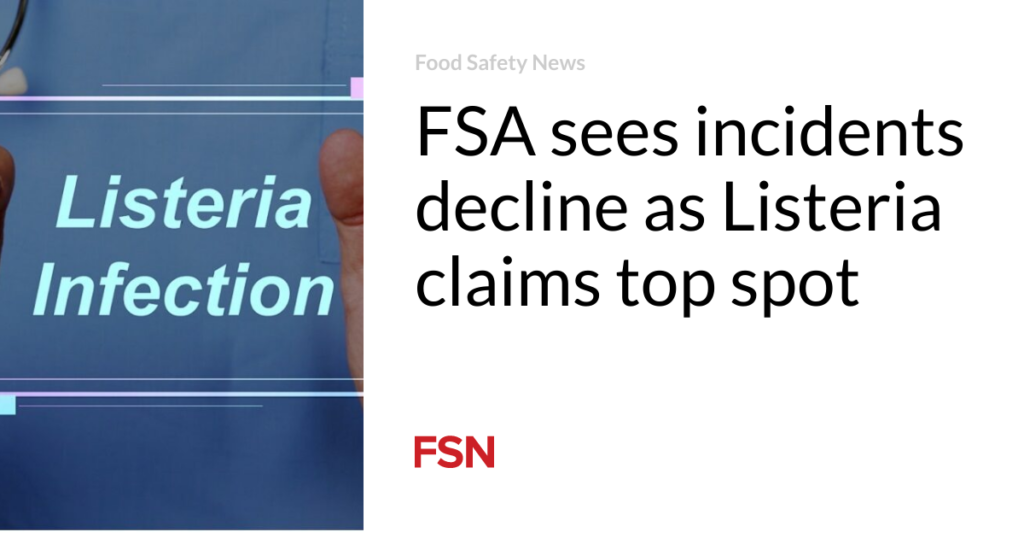In cases involving the Food Standards Agency (FSA), Listeria has overtaken Salmonella as the leading pathogen.
The FSA received 1,837 food and feed safety incidents reported to it in England, Northern Ireland and Wales in 2023/24 – the lowest number for the past six years.
Though the number of cases is declining, officials said they are dealing with more complicated cases and outbreaks that take longer to solve, such as glycerol found in counterfeit Wonka chocolates and slushie ice drinks.
The main types of hazards include pathogenic microorganisms, allergens, food additives and flavorings, and inadequate controls.
More than 300 incidents involved meat and meat products, followed by diet foods and dietary supplements with 136 incidents, followed by poultry meat products, cereals and bakery products, and fruit and vegetables.
Incidence by pathogen
There were 55 food poisoning outbreaks and incidents. Listeria monocytogenes was the most common pathogen, a change from the previous year when Salmonella was the most common. There were 13 Listeria alerts, 12 Shiga toxin-producing E. coli (STEC) alerts, 11 suspected norovirus alerts, and 9 Salmonella alerts. Seven of the STEC incidents were non-O157.
“Laboratories in England are prioritizing strengthening their detection techniques for human STEC, so we expect to see a continued increase in the detection of food poisoning and outbreak investigations caused by a wide range of pathogenic STEC,” the FSA said.
Examples of Listeria outbreaks affecting vulnerable consumers include those traced to a smoked salmon supplier, illnesses associated with health care settings, a manufacturer of cooked chicken that supplies a sandwich company, and a raw milk cheese manufacturer.
One of the issues highlighted was Salmonella-contaminated poultry meat and eggs imported from Poland. In 2020 and 2021, there were serious Salmonella Enteritidis outbreaks linked to frozen breaded chicken. Poland has introduced voluntary measures and additional legislation to improve the situation.
The issue was raised again in late 2023. An audit of Poland’s poultry management in April 2024 yielded mainly positive results, indicating that authorities were taking steps to control the issue.
An outbreak of Shiga toxin-producing Escherichia coli (STEC) O145 occurred in December 2023, with 36 confirmed and 1 suspected cases. Patient sample collection dates ranged from July to December 2023, and ages ranged from 2 to 81 years. There was a high rate of hospitalization and one death.
Epidemiological and food chain investigations suggested a link to unpasteurized cheese, with many of the cases occurring on the same train operating company that served such cheese as part of charcuterie boards. Samples taken by the Animal and Plant Health Service found the outbreak strain in the environment of a farm that supplied cheese to Mrs. Kirkham’s Cheese, which resumed selling the cheese in April.
Non-conforming products and their root causes
There has been an increase in the sale in retail stores and online of goods not intended for the UK market from countries such as the US, accounting for 5% of incidents in 2023/24.
The items include soft drinks, confectionery and cereals. Some do not comply with UK food additives law and contain undeclared ingredients or prohibited substances. The FSA has written to 49 UK companies identified as importers, reminding them of their legal responsibility to ensure the food they supply is compliant with regulations.
More than 255 root cause analysis reports were received from companies involved in incidents. Undeclared milk allergens and Salmonella were the two main trend areas.
The main cause of non-declaration of milk is processing errors. One example is when ingredients, including milk, are not listed on the label. In the case of Salmonella, the main cause is related to incorrect ingredients. This includes chicken being contaminated before it arrives at the company, but not detected, leading to cross-contamination during subsequent processing.
Its involvement with the International Food Safety Authority Network (INFOSAN) has been scaled back, but the FSA has nevertheless secured an agreement with the EU Commission to discuss directly any major accidents or outbreaks.
(Click here to sign up for a free subscription to Food Safety News.)


